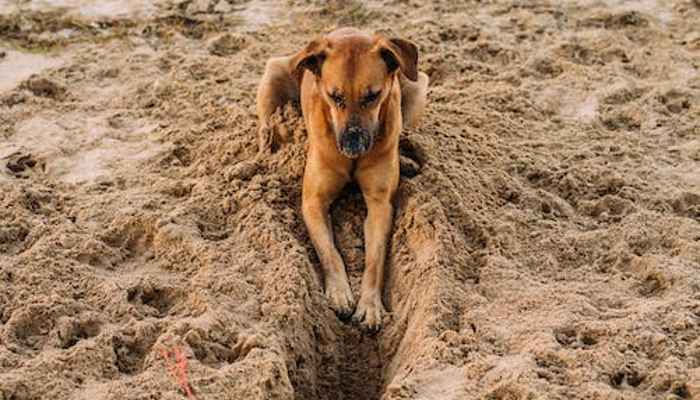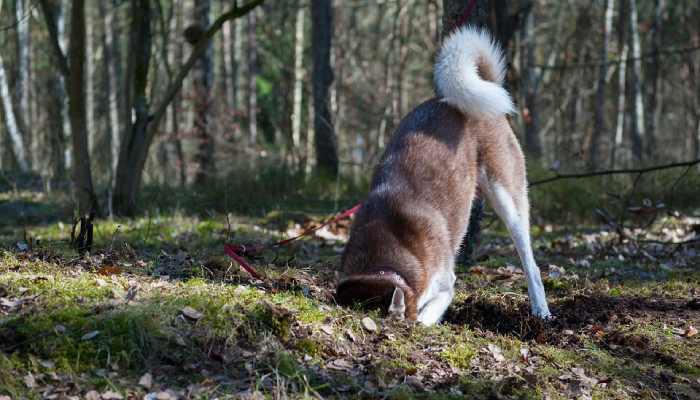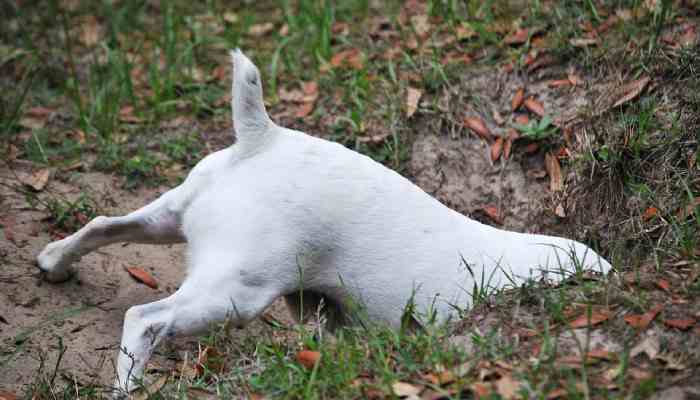Are you tired of your furry friend digging holes in your garden or ruining your freshly-planted flowers? If so, you are not by yourself. Among pet owners, dog digging is a typical problem, but why do dogs dig in the first place? It’s time to put the enigma to rest and learn the real reason for this dog’s actions. In this essay, we’ll delve into the field of canine psychology and examine the different instinctive, environmental, and psychological elements that contribute to dogs’ digging behaviour. Prepare to understand the cause of your dog’s digging and discover appropriate management techniques. Grab a shovel, and let’s start digging!
I. Instinctual Digging
Digging is a natural instinct for dogs, and it’s rooted in their ancestral heritage. Whether it’s digging to create a den for protection or digging to hunt for prey, it has always been a crucial part of a dog’s survival. When it comes to domesticated dogs, this instinctual urge to dig can manifest in various ways, such as digging in the dirt, digging at bedding or toys, or even digging holes in the ground. But it’s not just an instinctual urge, it’s also an important form of exercise that stimulates both the body and the mind. By engaging in digging behaviour, dogs can expend energy, sharpen their claws, and improve their dexterity. So, the next time you see your dog digging, remember that it’s not just a behaviour problem, it’s a natural and healthy part of being a dog.
II. Environmental Factors
Dogs’ digging behaviour can be significantly influenced by boredom, temperature, and strange locations. Dogs who are bored are more prone to dig in an effort to find stimulation or entertainment. Dogs may also dig to provide a cooler or warmer location to settle in when the weather is too hot or cold. Dogs may dig to generate a sense of security or to become comfortable with their surroundings, therefore new or unfamiliar locations can also cause digging. By being aware of how these environmental elements affect dogs, pet owners may take action to give their canines a more pleasant and comfortable environment, hence lessening the initial drive to dig.
III. Psychological Factors
Additionally, psychological issues including separation anxiety, attention-seeking tendencies, and territoriality might lead to digging. Dogs with separation anxiety may dig as a coping mechanism for their worry and stress. Dogs who crave attention may dig to attract their owners’ attention and get them to interact. Territorial dogs, on the other hand, would dig to mark their area and demonstrate their dominance. It’s essential to comprehend these underlying psychological causes and take appropriate action. Pet owners can aid in reducing their dog’s digging activity and enhancing their health by providing a cosy and safe environment, showing them enough love and attention, and encouraging positive reinforcement.
IV. Training and Management
Training and management are key components in reducing a dog’s digging behaviour. Providing a designated digging area for your dog can fulfil their natural urge to dig and keep them from digging in areas you don’t want them to. Positive reinforcement is an effective way to discourage digging behaviour and encourage desired behaviour. Reinforcing good behaviour with treats, praise, and affection can help reduce digging behaviour over time. Additionally, by providing enough exercise, mental stimulation, and opportunities for interaction, you can keep your dog occupied and reduce boredom-related digging. By implementing these training and management techniques, pet owners can successfully curb their dog’s digging behaviour and promote a healthy and happy lifestyle.
In conclusion, digging is completely normal for dogs and is natural to them. It may be brought on by psychological, environmental, or innate reasons. Pet owners can successfully limit their dog’s digging tendency by being aware of these variables and putting training and management tactics into practise. The secret is to be persistent, patient, and encouraging—from designating a specific digging area to rewarding excellent behaviour. Pet owners can assist their animal companions in leading a happy and healthy life, free from the stress and annoyance caused by digging, with the appropriate approach. So let’s embrace our dogs’ innate desire to dig and collaborate to strike the ideal balance between obedience and irrationality. After all, a happy dog equals a happy home!



